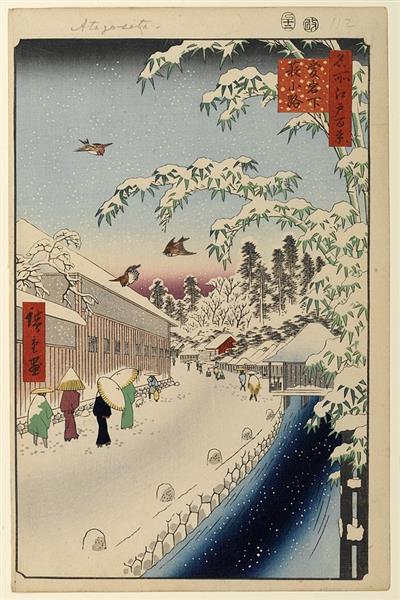Description
The work 112. Atagoshita and Yabu Lane, created in 1857 by the renowned Japanese artist Utagawa Hiroshige, is a remarkable example of the mastery of ukiyo-e, a style of Japanese printmaking that captures the ephemeral essence of everyday life and nature. Hiroshige, known for his ability to represent landscapes in a poetic and often melancholic manner, manages in this painting to unite elements of composition, color, and the delicate balance between man and his environment.
In the piece, a serene representation of the urban landscape is observed, where the juxtaposition of architecture and the natural environment becomes a silent protagonist. The use of fluid and defined lines for the structures, along with the integration of trees and bodies of water, evokes an almost dreamlike atmosphere. The perspective is clever; we are invited to perceive the space from a slightly elevated view, offering a depth that encourages viewers to contemplate the surroundings with a more introspective gaze.
Color plays a crucial role in the work. Hiroshige employs a palette of soft and velvety tones, dominated by muted blues and greens that contrast with the structures in terracotta and gray tones. This chromatic balance not only highlights the harmony of the landscape but also evokes a sense of tranquility and serenity, characteristics that are essential in Hiroshige's work. The skies, painted with subtle hues, suggest a transition from day to night, creating an atmospheric effect that invites contemplation.
As for the representation of characters, the work is not crowded with human figures, maintaining the artist's preference for atmosphere over strict narrative. When they appear, the characters are observed in attitudes that reinforce the connection with their environment. This emphasizes the philosophy of ukiyo-e, where the focus is on the relationship of the human being with the world around them, highlighting a sense of belonging and a life that intertwines harmoniously with nature.
Throughout his career, Hiroshige created a series of works representing paths, bridges, and landscapes that invite the viewer to travel through them, in an imaginative exploration of Japan in his time. “Atagoshita and Yabu Lane” fits within this tradition, offering a window into everyday life at a time when Japan was beginning to open up to external influences, balancing nostalgia for the past with curiosity for the future.
This work, a piece from the album "Famous Views of Edo," reflects not only Hiroshige's technical skill but also his deep understanding of the passage of time and the impermanence of beauty. Thus, “Atagoshita and Yabu Lane” stands as a work that is not only significant within Hiroshige's trajectory but also as a milestone in the history of art that continues to fascinate art lovers, carrying with it an echo of 19th-century Japan, both close and distant. The subtlety of its aesthetic and the emotional depth it emanates make this painting a lasting testament to the genius of ukiyo-e and the legacy that Hiroshige has left in the art world.
KUADROS ©, a famous painting on your wall.
Hand-made oil painting reproductions, with the quality of professional artists and the distinctive seal of KUADROS ©.
Reproduction service of paintings with a satisfaction guarantee. If you are not completely satisfied with the replica of your painting, we will refund 100% of your money.

